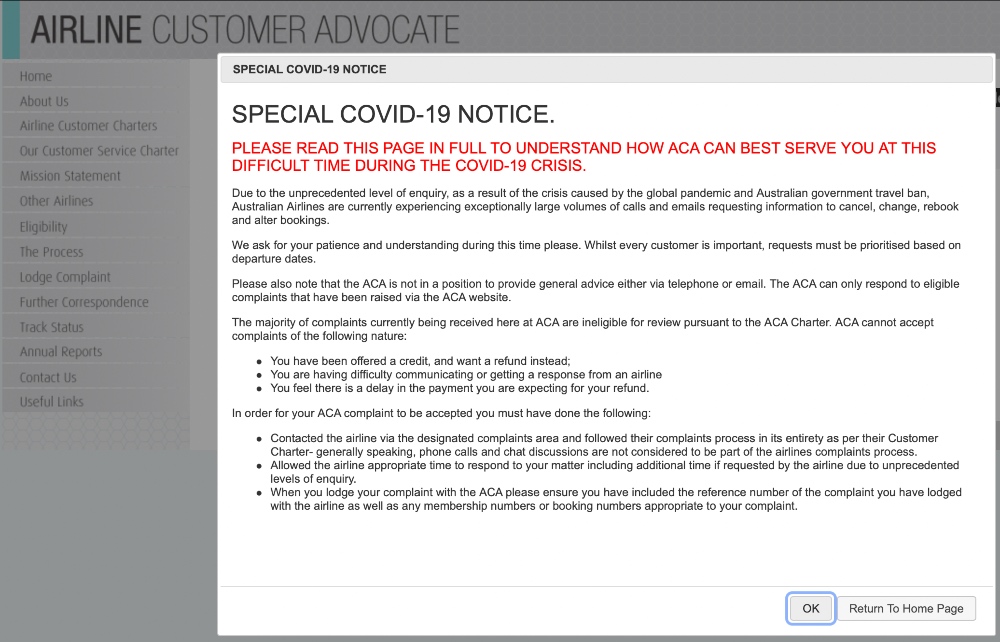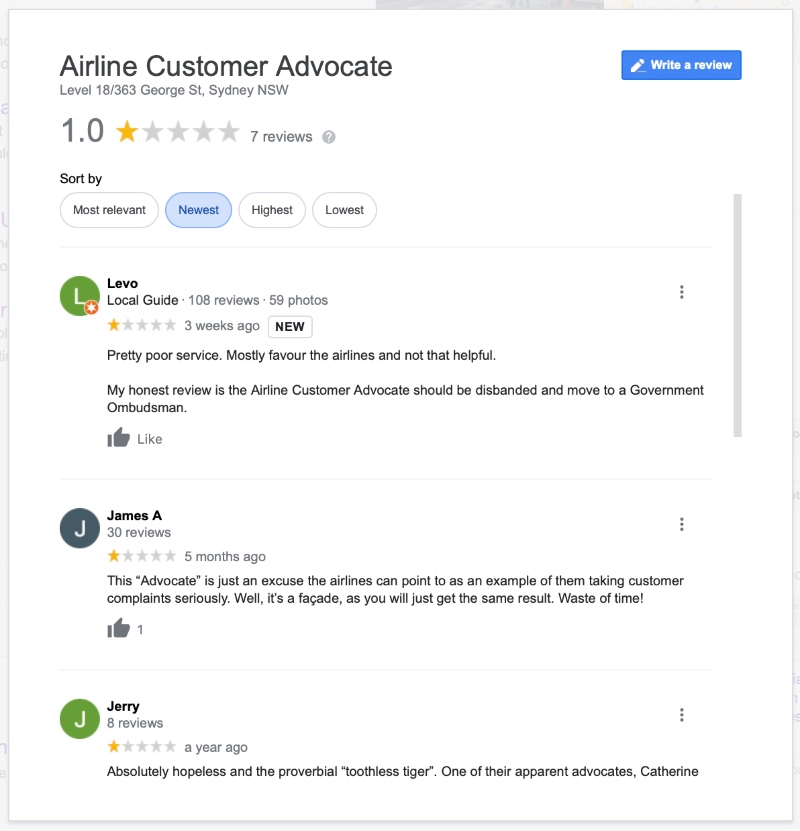Airline Customer Advocate “Ineffective”

There are renewed calls for the Airline Customer Advocate to be replaced by an independent ombudsman, after consumer advocacy group CHOICE found it has failed to resolve airline complaints – especially during COVID-19.
Since 2012, the Airline Customer Advocate (ACA) should have been helping Australians to resolve airline complaints. But its scope is limited and it has no power to force the airlines that fund it to take any action.
According to CHOICE, the current de-facto “ombudsman” for the airline industry has been missing in action during the COVID-19 pandemic, despite travel-related complaints increasing by almost 500% in 2020.
What is the Airline Customer Advocate?
The Airline Customer Advocate was established in July 2012. According to the ACA, its role to “facilitate the efficient resolution of complaints about airline services that have not been resolved by direct communication” between customers and the four participating airlines – Qantas, Virgin Australia, Jetstar and Rex.
The Airline Customer Advocate is not an independent ombudsman. The free service is funded entirely by the participating airlines and, according to its own website “does not have independent power to make decisions that affect the participating airline’s response to your complaint”.
The Australian airline industry set up the Advocate as a result of the federal government’s 2009 White Paper on Aviation. At the time, this white paper found that the airlines did not have effective complaint resolution processes and threatened compulsory regulations if the industry didn’t lift its game within a year.
“The government will monitor the industry’s efforts to develop proposals to better handle consumer complaints over the coming year, and will consider a more interventionist approach should this become necessary,” the white paper said.
Thus, the Airline Customer Advocate was born. Satisfied that the airlines were taking their responsibility seriously, the federal government did not intervene further.
In the past, the Airline Customer Advocate has actually been quite helpful in resolving many airline complaints. In its early days, it helped several AFF members including GaryBne, Bazzi and kpc. I personally have also had an airline complaint resolved effectively by the ACA in 2017 after I was unsatisfied with the airline’s response.
But in recent times – especially since the onset of COVID-19 – the ACA seems to have lost some of its shine.
CHOICE holds major concerns about the Airline Customer Advocate
In its recent report on consumer protections for Australian travellers, CHOICE expressed major concerns about the industry-funded service.
“The limitations on the role and powers of the Airline Customer Advocate mean that it is not able to genuinely help most people,” the CHOICE report said.
“CHOICE also holds major concerns about the effectiveness of the Airline Customer Advocate (ACA) – the complaints escalation point for the domestic airline industry. Unlike independent ombudsman schemes in the finance, telecommunications and energy industries, the ACA has no power to require that airlines comply with its decisions.”
In a recent interview on the AFF on Air podcast, CHOICE Head of Policy and Government Relations Alison Elliott doubled down on the criticism.
“Our conclusion is that the Airline Customer Advocate has not been effective in assisting consumers throughout 2020 and 2021,” Elliott said.
Limited scope to assist with COVID-related airline complaints
This is not surprising because the Airline Customer Advocate’s charter is designed (by the airlines, who set it up) to have limited scope. Only certain types of complaints about Australian airlines are accepted, and only in cases where customers have already tried to get a resolution from the airline and have received a response from the airline in writing.
These limitations have become even more evident during COVID-19. According to a notice that currently appears on its website, “the majority of complaints currently being received here at ACA are ineligible for review pursuant to the ACA Charter”.

In other words, the ACA is not set up to handle the most common COVID-related airline complaints. And, because you need to have already tried to get your complaint resolved and had a response from the airline in writing, the ACA can’t assist if the reason for your complaint is that the airline hasn’t responded to you or won’t answer the phone.
Many complaints ineligible or unresolved
While the ACA appears to be particularly ineffective at resolving issues relating to COVID-19, this is not the only problem.
In 2018, 70.7% of eligible complaints received by the ACA were resolved. But in 2019, according to the ACA’s own annual report, this number dropped to 55% of complaints resolved. And in 2019, of the airline customers with finalised complaints who responded to a satisfaction survey, only 48% said they felt their complaint had been resolved.
The ACA has not yet released its annual report for 2020, so we don’t yet know how many complaints were received and resolved last year.
It’s also quite telling that every Google review for the Airline Customer Advocate is for 1 star out of 5.

The Airline Customer Advocate did not respond to Australian Frequent Flyer‘s request for comment by our deadline. However, we do notice that the ACA’s 2019, 2017 and 2013 annual reports have now appeared on their website since we pointed out that these were all either missing or had broken links.
What should the ACA be replaced with?
With the industry-funded service proving to be a toothless tiger, CHOICE suggests that a new, independent ombudsman should be set up which has the power to compel airlines to take action.
According to CHOICE’s report: “Analysis of the 4,443 survey responses identified five responses that mentioned the ACA, and four of these mistakenly referred to it as an ombudsman. The fact that very few people mentioned the ACA indicates that consumers are either unaware of it or do not see it as an effective vehicle through which to raise a complaint. Those who did mention the body had the mistaken belief that it had the powers of an independent ombudsman.”
Alison Elliott told the AFF on Air podcast that CHOICE thinks there’s “a really strong case for looking at other models of helping people to resolve their complaints.”
“We know that the best models of consumer complaint forums require independent boards with appropriate representation of consumers, and perhaps industry representatives as well, so that we know that, whilst being informed by expertise and understanding of the sector, that there is an overarching ethos of independence applying.
“There are very interesting funding models for such ombudsman schemes which incentivise businesses to quickly, promptly and fairly resolve these issues.”
With most airline customers unaware of the Airline Customer Advocate’s role (or even its existence), many are already choosing to complain to state-based fair trading and consumer authorities instead – often with better outcomes, too.


